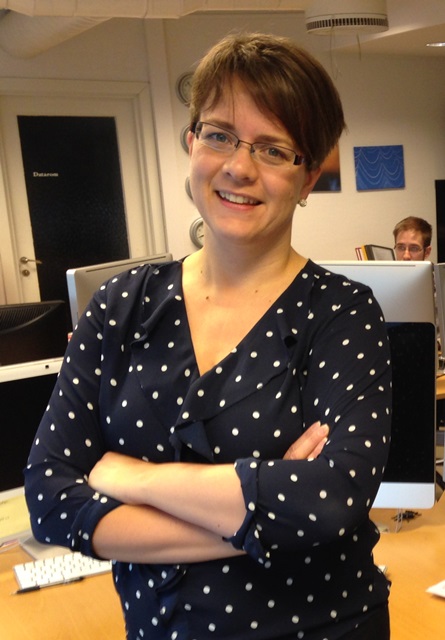Spotlight on Astrid Dalehaug Norheim

For more than 20 years, Astrid Dalehaug Norheim has been writing about religion in Norway. Currently, she is political editor for the Christian newspaper Dagen Religion has been a part of her reporting since she started working as a journalist in 1992. She has done important reporting on how Norwegian Asylum Authorities view asylum applications from converts, and on sexual harassment and abuse in Christian organizations and churches.
She has been on the board of The Norwegian Union of Journalists for four years, and she has been involved in a forthcoming book on religion reporting for journalists, which will be published next year.
Questions and Answers with Astrid Dalehaug Norheim
Q:
What are the main religions in your region?
A:
In Norway, as well as in other Scandinavian countries, the main religion is Christianity. Here in Norway we have the State Church—The Church of Norway, Den norske kirke, professing the Lutheran Christian faith—a church for which until recently the government appointed the bishops and paid for the church. This is changing. The government no longer appoints bishops, and responsibilities for church costs will be split, though the government will continue to support it financially. About 76 percent of the population are members of the state church, but there are many other Christian faiths communities. Among minorities, the Muslim community is the largest.
Q:
What are the key issues affecting Norway when it comes to religion?
A:
I think most people would say that political issues related to the Muslim community are a high concern. These questions include such day-to-day matters as, can police wear a hijab. Bigger issues include ISIS, and Norwegian people going to Syria to fight. Related concerns are how to avoid radicalization; how much can imams, mosques and Islamic communities, as well as security authorities in Norway, do to prevent this; and why and how this is happening.
Other issues concern school. We see discussions about how to teach religion in primary schools; the approach has changed several times in previous years and in changing yet again. And there is a debate within the church itself about whether to allow same-sex marriage.
Regarding people’s everyday lives, because Norway is quite a secularized country many people would say religion doesn’t affect them that much. The number people attending the Norwegian Church is decreasing, while there is an increase in the number of people attending Catholic churches. This is due mainly to Polish immigration. Because there are not many Catholic churches in Norway, there are often long queues outside these churches, and the doors are kept open during services so that people can listen to what is happening inside.
Q:
What challenges have you faced as a religion reporter?
A:
As a reporter for a Christian paper, we have easy access to sources inside the church, and we know Christian Norway quite well. But there is a down side to these sources. Because of the close relationship between church and state, religious sources are always as professional as, say, political sources.
The Internet is a challenge as well, now that we are publishing quite a lot online. The numbers of people reading the print edition are falling, so we have to make sure we are writing for an online audience. Thus, we have to explain things in different ways. I think that’s a good challenge for us.
It’s actually a bit harder to get into Muslim communities. It takes time to develop good sources; we have to listen to this community and get to know them better.
Finally, many people don’t see religion as an important topic to be covered. I see other journalists who face newsrooms and editors that have no interest in pursuing these stories.
Q:
Why do you think religion reporting is so important?
A:
Because it explains in many ways how people act and why they are doing what they are doing. I find it interesting that when I started studying comparative politics 20 years ago at the University of Bergen, religion wasn’t even mentioned. It was discussed in other parts of the university. It took me 15 years to realize that if you want to understand what is happening in our society you need to understand more about religion and Islam, which I didn’t know very well.
So I went back to university just to study Islam, to be able to ask the good questions and be able to understand the tradition better.
Today, in international politics, religion is on everyone’s lips as people try to understand ISIS, the church’s role in the Ukrainian conflict.
Q:
How can we, as a community of journalists, improve reporting on religion, making it accurate and interesting while avoiding sensationalism?
A:
This is a big question. I think one key is simply writing good stories that inspire others to appreciate the role religion plays in their lives—whether they themselves are religious or not.
As journalists, we love numbers, and we love to show how things change through the years. To do this, you must be able to locate the resources to help you understand these changes. Too many of us don’t know where to find such resources, or the experts who can deliver the good quotes. We find these resources and experts by networking—for me, especially, that means other journalists in Europe—and by getting to know other journalists who are covering religion.
Q:
What do you hope to get out of being a member in the IARJ?
A:
Ideas, networking, inspiration, resources.
Everyday life is so busy; we really need easy access to networks and ideas so that when something happens we can call colleagues in other countries to better understand what’s is going on. Life is so globalized, why shouldn’t we cooperate more? We are so busy from day to day publishing our own stories in our own countries. If we cooperated cross-border, we could have better reporting and improve understanding.
